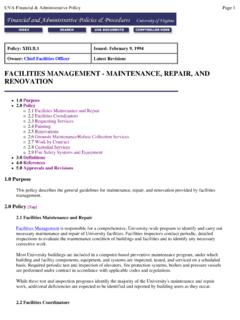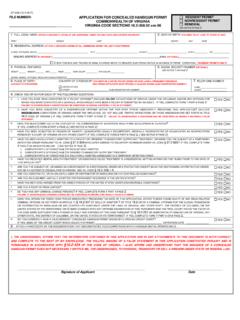Transcription of Starting and Maintaining A Quality Internship …
1 1 Starting and Maintaining A Quality Internship Program Sponsored by the Technology Council of Central Pennsylvania Compiled and edited by Michael True Director, Internship Cneter Messiah College Grantham, PA 17027 (Please note: The University of Virginia has made some edits for specific use from our employers. All such edits have been made in blue type.) Special thanks to the Pittsburgh Technology Council and Messiah College for providing materials to make this manual possible. Second Edition 2 CONTENTS: INTRODUCTION Page 2 STEPS TO BEGINNING AN Internship PROGRAM Page 3 TEN CONCERNS OF INTERNS Page 7 LEGAL ISSUES Page 8 INTERNATIONAL STUDENTS PAGE 9 ORIENTING AND TRAINING INTERNS Page 10 DEVELOPING WORK ACTIVITIES AND MEASURABLE LEARNING OBJECTIVES Page 12 SUPERVISING THE INTERN Page 13 SAMPLE EMPLOYER EVALUATION OF STUDENT INTERN Page 15 SAMPLE STUDENT EVALUATION OF Internship Page 17 RESOURCES Page 19 INTRODUCTION The experienced employees who require very little, if any, training.
2 But this dream conflicts with reality. How can organizations meet the needs of today and prepare the workforce of the future? One solution is to develop a Quality Internship program. This booklet will assist you in doing just that. What Is An Internship ? An Internship is any carefully monitored work or service experience in which a student has intentional learning goals and reflects actively on what she or he is learning throughout the experience. Characteristics include: Duration of anywhere from a month to two years, but a typical experience usually lasts from three to six months. Generally a one-time experience. May be part-time or full-time. May be paid or non-paid (see Legal Issues). Internships may be part of an educational program and carefully monitored and evaluated for academic credit, or internships can be part of a learning plan that someone develops individually.
3 An important element that distinguishes an Internship from a short-term job or volunteer work is that an intentional learning agenda is structured into the experience. Learning activities common to most internships include learning objectives, observation, reflection, evaluation and assessment. An effort is made to establish a reasonable balance between the intern s learning goals and the specific work an organization needs done. Internships promote academic, career and/or personal development. (Adapted from materials published by the National Society for Experiential Education (NSEE) How Do Internships Benefit Employers? Year round source of highly motivated pre-professionals Students bring new perspectives to old problems Visibility of your organization is increased on campus Quality candidates for temporary or seasonal positions and projects Freedom for professional staff to pursue more creative projects Flexible, cost-effective work force not requiring a long-term employer commitment Proven, cost-effective way to recruit and evaluate potential employees Your image in the community is enhanced as you contribute your expertise to the educational enterprise 3 STEPS TO BEGINNING AN Internship PROGRAM Designing an Internship program that meets your needs As varied as companies are in age, size, industry and product, so too are their Internship activities.)
4 How do you know what kind of program will work best for you? Designing an Internship program to meet your needs is as easy as five steps. Step 1: Set goals What does your company hope to achieve from the program? Are you a small company searching for additional help on a project? Is your company growing quickly and having difficulty finding motivated new employees? Are you a nonprofit that doesn t have a lot of money to pay, but can provide an interesting and rewarding experience? Is your organization searching out new employees with management potential? A careful discussion with management in the organization can create a consensus on program goals that can be understood by all involved. The program and Internship can be designed to best meet those expectations. As many staffing professionals may know, in order for a program to be successful, it will require the commitment of management.
5 After all, management may be the people providing the Internship experience. Step 2: Write a plan Carefully plan and write out your Internship program and goals. After all, managers, mentors, interns and university career centers are all going to be reading what you write about the Internship . Draft a job description that clearly explains the job s duties. Do you want someone for a specific project? General support around the workplace? To give the intern a taste of everything your company does? Structure the Internship ahead of time so that you can be sure to meet your goals and not find yourself floundering partway through. (see the Internship Position Description later) Things to think about include: Will you pay the intern? If so, how much? Wages vary widely from field to field and location to location, so be sure yours are competitive or offer competitive incentives.
6 Where will you put the intern? Do you have adequate workspace for them? Will you help him or her to make parking arrangements, living arrangements, What sort of academic background and experience do you want in an intern? Decide on standards for Quality beforehand it ll help you narrow down the choices and find the best candidates. Who will have the primary responsibility for the intern? Will that person be a mentor or merely a junior manager gaining management experience? How many hours per week will the intern work? Do you need someone full-time in the summer? During the school year, the intern will also be meeting academic requirements. How many hours do you need the student to commit to while they do so? 4 What will the intern be doing? Be as specific as possible. Interns, like others in the process of learning, need structure so they don t become lost, confused or bored.
7 Do you want to plan a program beyond the work you give your interns? Will there be special training programs , performance reviews, lunches with executives, social events? Keep in mind that your interns are walking advertisements for your company. If they have a good experience working for you, they re likely to tell their friends word gets around. A bad Internship , by contrast, can only hurt your chances of attracting good students for next year. These are just some of the questions to consider. Your company s approach will depend on your specific resources and needs. A very important part of your plan should be the assignment of a mentor or supervisor that is, someone from the intern s department who will be in charge of the intern. This person doesn t have to be a teacher per se, but should be selected because he or she likes to teach or train and has the resources to do it.
8 If the person you select has never mentored an intern before, give him or her some basic training in mentoring. Step 3: Recruit an intern(s) How will you find those ideal candidates to fill your Internship position(s)? The number-one tip from those who have established programs is to get out there early! This cannot be overemphasized to companies that want the very best interns. Begin searching three to four months before you need a student to begin. Starting early has other advantages: the longer you accept applications, the better your chance of finding the best person for the job. The sooner you get one, the longer you have to form a good working relationship with him or her. When you re out recruiting, develop relationships with local recruitment resources. If you are interested in working with UVA s Employer Services Team to develop a specific recruiting plan to meet your needs, please contact our office at 434-924-8900.
9 Learn how to promote yourself through our Internship and job fairs, place ads in the Cavalier Daily and UVA websites, and send material to student organizations. And remember, choose your interns just as carefully as you d choose permanent employees. After all, they might be permanent employees some day. You re making an investment. Time and money will go into this person, and they won t pay off if they go into a flawed vessel. This is where the interview will come in handy: Is the intern truly motivated, or does he or she just want a job? Will the intern fit into your corporate culture? Does he or she have the level of experience you need? With careful consideration of whom to hire at the beginning, you can avoid some of the most common pitfalls of internships. Last, but certainly not least, learn the legal implications of hiring interns. Just like any other workers, they are subject to legal protections and regulations.
10 Protect yourself and your intern by knowing the laws: How much can you pay him or her? What work can and can t you assign? This is especially important if your company employs a lot of international students, who need special qualifications to work in the Consult your corporate lawyer 5or UVA s office of international education, if you think you might run into problems. (see legal section later in this manual) Step 4: Manage the intern(s) This is the easy part: Once you ve hired a worker, you have him or her work, right? That s true for interns as well as regular employees, but with an intern, you ll be making an important first impression. The beginning days of the Internship program are often its defining days. When you give them their first tasks, you re signaling what can be expected in the future. If you give them nothing or very little to do, it sends a message that this job will be easy and boring.














